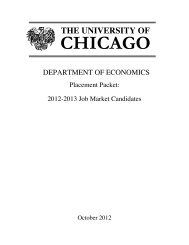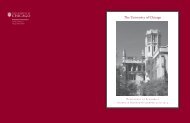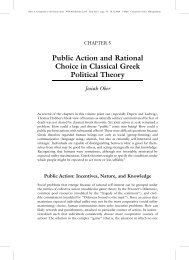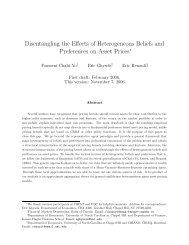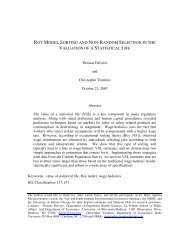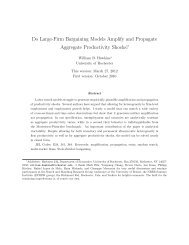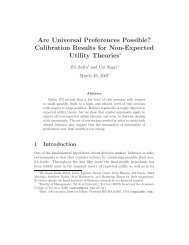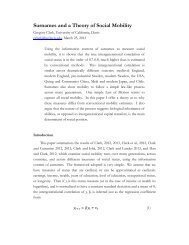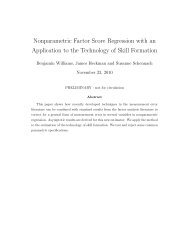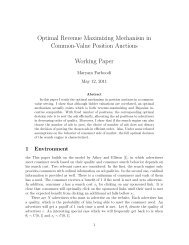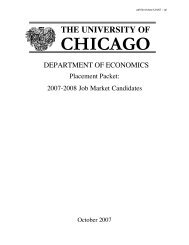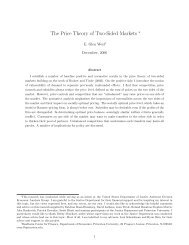CHICAGO - University of Chicago Department of Economics
CHICAGO - University of Chicago Department of Economics
CHICAGO - University of Chicago Department of Economics
You also want an ePaper? Increase the reach of your titles
YUMPU automatically turns print PDFs into web optimized ePapers that Google loves.
MITSUKUNI NISHIDA<br />
5547 S. Blackstone Ave., Apt 204 nishida@uchicago.edu<br />
<strong>Chicago</strong>, IL 60637<br />
http://home.uchicago.edu/~nishida<br />
Cellular: 312-513-3077<br />
EDUCATION Ph.D. <strong>Economics</strong> <strong>University</strong> <strong>of</strong> <strong>Chicago</strong> Expected June 2008<br />
B.A. International Relations Kyoto <strong>University</strong> March 1999<br />
FIELDS Primary: Industrial Organization<br />
Secondary: Computational <strong>Economics</strong>, Econometrics<br />
JOB MARKET<br />
PAPER<br />
WORKING PAPERS<br />
“Estimating a Model <strong>of</strong> Strategic Store Network Choice with Policy Simulation”<br />
Competition among multi-store chains is common in the retail industry. This paper proposes a method<br />
for estimating a model <strong>of</strong> strategic store network choices by two chains. In contrast to previous studies, I<br />
allow chains to not only choose which markets to enter but also how many stores to open in each <strong>of</strong><br />
those markets. To deal with the huge number <strong>of</strong> possible network choices, I use lattice-theoretical<br />
results. I show that a chain's net trade-<strong>of</strong>f between costs and benefits from clustering their stores in a<br />
market can be either positive or negative while still ensuring the existence <strong>of</strong> an equilibrium, thereby<br />
providing a way to freely estimate this within-market effect from the data. By integrating the model with<br />
revenue data, I show that one is able to decompose the within-market effect into cost savings from<br />
economies <strong>of</strong> density and lost revenues from competition with one’s own stores. I apply the technique to<br />
a unique cross-sectional data set from the convenience store industry in Okinawa, Japan, to obtain cost<br />
and demand parameters. The estimates imply a strong business stealing effect among own stores. I then<br />
use the estimated structural model to perform two counterfactual analyses. First, I evaluate the impacts<br />
<strong>of</strong> a hypothetical merger <strong>of</strong> two chains. I find that post-merger total surplus is expected to decrease due<br />
to reduction in the number <strong>of</strong> stores and total sales. Second, I consider how significantly the zoning<br />
regulation introduced in Japan in 1968 affects store network choices. Eliminating the regulation would<br />
increase the number <strong>of</strong> stores, but the magnitude <strong>of</strong> the increase is limited.<br />
“Estimating Aggregate Productivity Growth with Plant Level Data when Markets Are Not Competitive,”<br />
joint with Amil Petrin<br />
“Why Does a First-Mover Get Benefits? Evidence from the Convenience Store Industry”<br />
RESEARCH & Research Assistant for Pr<strong>of</strong>. Amil Petrin at <strong>Chicago</strong> GSB 2005-2006<br />
TEACHING Teaching Assistant: Undergraduate Econometrics A (Pr<strong>of</strong>. Jeremy Fox) Winter 2008<br />
EXPERIENCE Microeconomics (Pr<strong>of</strong>. Sebastian Ludmer) Winter 2006<br />
GRANTS, FELLOW- NET Institute Research Grant (www.NETinst.org) 2008<br />
SHIPS & AWARDS Dissertation Fellowship, the Center <strong>of</strong> East Asian Studies, <strong>University</strong> <strong>of</strong> <strong>Chicago</strong> 2008-2009<br />
The Joint Japan/ World Bank Scholarship 2005-2007<br />
Endowed Scholarship, <strong>University</strong> <strong>of</strong> <strong>Chicago</strong> 2004-2005<br />
1 out <strong>of</strong> 122 in <strong>Economics</strong>, National Personnel Authority <strong>of</strong> Japan 1998<br />
CONFERENCE European Association for Research in Industrial <strong>Economics</strong> (EARIE), France 2008<br />
PRESENTATIONS Econometric Society Far Eastern and South Asian Meeting, Singapore 2008<br />
Midwest <strong>Economics</strong> Association Annual Meeting, <strong>Chicago</strong> 2008<br />
SEMINAR <strong>University</strong> <strong>of</strong> <strong>Chicago</strong> Industrial Organization seminar; micro lunch seminar 2008<br />
PRESENTATIONS Kyoto; Tokyo; Yokohama National; Hitotsubashi; Tsukuba; IDE-JETRO 2008<br />
EMPLOYMENT Overseas Researcher, National Personnel Authority <strong>of</strong> Japan 2002-2004<br />
Economist, Division for Economic Outlook, Cabinet Office, Japan 2001-2002<br />
Section Chief, Ministry <strong>of</strong> Economy, Trade and Industry, Japan 1999-2001<br />
REFEREE International Journal <strong>of</strong> Industrial Organization 2008<br />
REFERENCES Jeremy Fox (chair) <strong>University</strong> <strong>of</strong> <strong>Chicago</strong> 773-702-4862 fox@uchicago.edu<br />
Ali Hortacsu <strong>University</strong> <strong>of</strong> <strong>Chicago</strong> 773-702-5841 hortacsu@uchicago.edu<br />
Chad Syverson <strong>University</strong> <strong>of</strong> <strong>Chicago</strong>, GSB 773-702-7815 syverson@uchicago.edu<br />
Jean-Pierre Dubé <strong>University</strong> <strong>of</strong> <strong>Chicago</strong>, GSB 773-834-5377 jdube@chicagogsb.edu



